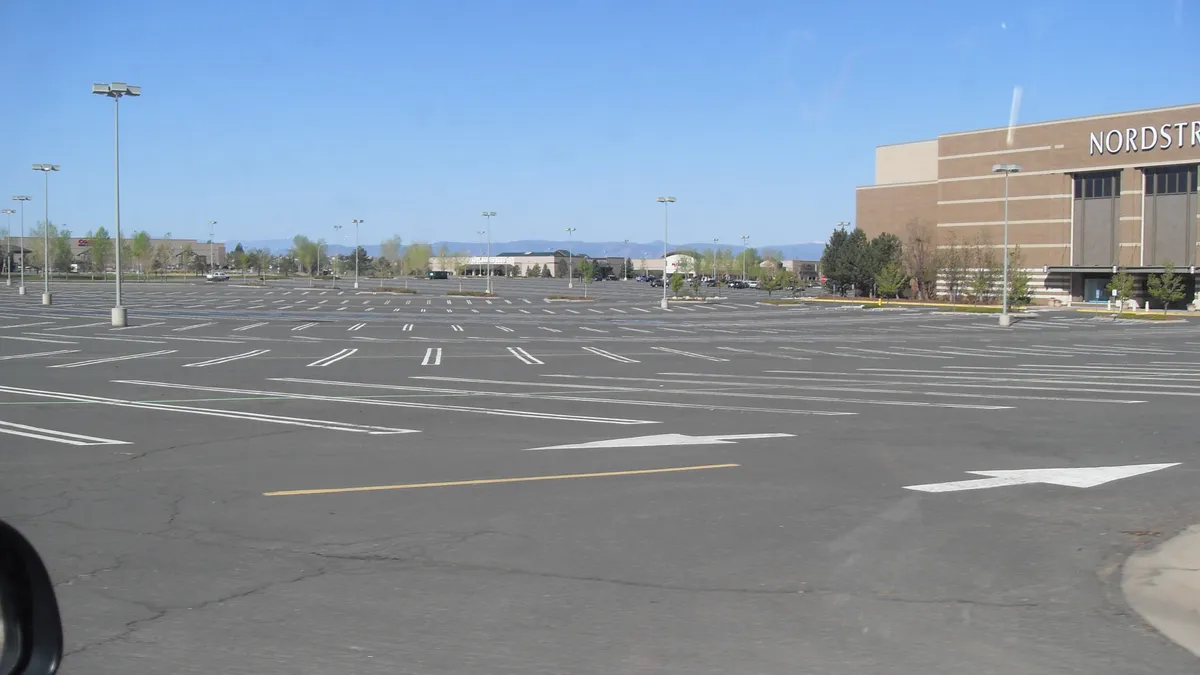Dive Brief:
- Foot traffic to apparel and other retailers selling soft goods like linens is down around 100% as companies have shuttered their stores amid the COVID-19 fight, according to analyst reports from Morgan Stanley and Cowen.
- The declines mounted through March as retailers shuttered stores. Morgan Stanley analysts said in an emailed client note that all 22 store-based retailers they cover have closed in response to the COVID-19 pandemic and half of them are now closed "until further notice."
- Foot traffic has declined at some major retailers that have remained open to sell key household goods. According to traffic analytics firm Placer.ai, traffic in the third week of March fell 20.5% at Target, 6.7% at Walmart and 8.7% at Costco, after traffic had spiked at all three retailers in the earlier weeks.
Dive Insight:
Hundreds of malls and tens of thousands of stores have temporarily closed across the country as part of the broader effort to slow the spread of COVID-19. Against that backdrop, equity analyst Kimberly Greenberger and her team at Morgan Stanley describe the "severe" 97.6% traffic decline they measured as "unsurprising."
They expect traffic to remain down by as much as 100% until stores reopen and government recommendations on social distancing loosen, which is likely to go on until "at least May," the analysts said.
As stores close, "eCommerce revenue growth does not appear to be offsetting lost store revenue," the analysts said in the note. The majority of the retailers covered by the analysts have an e-commerce store, which for them remains the only medium for sales. But "none have indicated US eCommerce sales have accelerated from pre-COVID growth rates, meaning lost store sales are simply lost and not recouped online," the analysts said.
Moreover, Greenberger's team found, retailers have been discounting products online to drive traffic, making for a margin hit on top of the added costs of e-commerce.
A near halt of discretionary retail traffic may have been expected, given closures and restrictions on non-essential businesses that cover most of the country's population for now. The falls at some of the largest mass merchants — including Walmart, Target and Costco — show just how deep the retail slowdown goes.
"Critically, the benefit that these brands saw in the early days of the coronavirus are being dampened by increasingly strict regulations," Ethan Chernofsky, Placer.ai vice president of marketing, said in a blog post this week.
He added, "The major question is whether these brands are seeing a temporary decline driven by customers having already bought the things they need or are they finally experiencing the direct impact of a coronavirus trend that could ultimately impact all sectors."
Target and its CEO have said previously that the retailer has seen an unprecedented surge in demand for household goods and food, while sales of apparel and some other categories have declined. The company has pulled back on its planned investments for the year while it regroups around shifts in consumer behavior driven by the pandemic. The company is also leaning on its delivery and pick-up services, which could affect foot traffic numbers.
A tracker developed by Placer.ai shows foot traffic falling across the retail world, including stores that have stayed open as essential retailers and sell daily necessities, including drugstores and office supply stores. The tracker, which measured traffic as recently as March 29, shows that drop-offs at Walmart, Target and Costco have become even deeper since the third week of the month.
Among major retailers, only Lowe's and Dollar General have seen traffic increases, according to Placer.ai.















